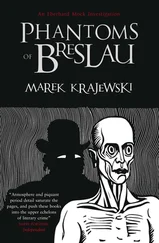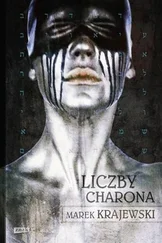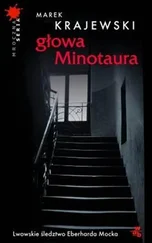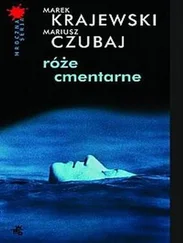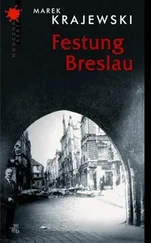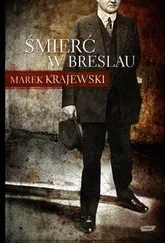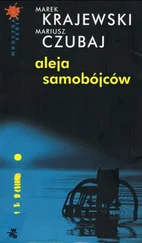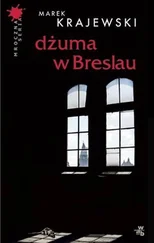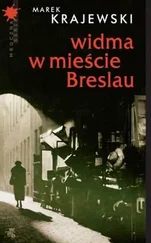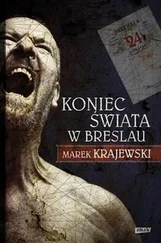Marek Krajewski - Death in Breslau
Здесь есть возможность читать онлайн «Marek Krajewski - Death in Breslau» весь текст электронной книги совершенно бесплатно (целиком полную версию без сокращений). В некоторых случаях можно слушать аудио, скачать через торрент в формате fb2 и присутствует краткое содержание. Жанр: Полицейский детектив, на английском языке. Описание произведения, (предисловие) а так же отзывы посетителей доступны на портале библиотеки ЛибКат.
- Название:Death in Breslau
- Автор:
- Жанр:
- Год:неизвестен
- ISBN:нет данных
- Рейтинг книги:3 / 5. Голосов: 1
-
Избранное:Добавить в избранное
- Отзывы:
-
Ваша оценка:
- 60
- 1
- 2
- 3
- 4
- 5
Death in Breslau: краткое содержание, описание и аннотация
Предлагаем к чтению аннотацию, описание, краткое содержание или предисловие (зависит от того, что написал сам автор книги «Death in Breslau»). Если вы не нашли необходимую информацию о книге — напишите в комментариях, мы постараемся отыскать её.
Death in Breslau — читать онлайн бесплатно полную книгу (весь текст) целиком
Ниже представлен текст книги, разбитый по страницам. Система сохранения места последней прочитанной страницы, позволяет с удобством читать онлайн бесплатно книгу «Death in Breslau», без необходимости каждый раз заново искать на чём Вы остановились. Поставьте закладку, и сможете в любой момент перейти на страницу, на которой закончили чтение.
Интервал:
Закладка:
The father and son stood face to face. Delicate streaks of dawn began to creep into the hall. The Baron remembered the June nights of 1902 when he would creep into the servants’ quarters, and the sheets — drenched with sweat — when he left; he remembered the disciplinary whipping which Ruppert von der Malten had personally bestowed on his twenty-year-old son; he remembered Hanne Schlossarczyk’s terrified looks as she left the lordly residence, literally booted out by the servants. He broke the ringing silence with a matter-of-fact answer.
“I found out about the Yesidi’s curse today. And I wanted to tell you about our close relationship were the investigation to come to a dead stop. That would have encouraged you to go on.”
“Close relationship … (Do you have a relative, asked the tutor, even a distant one? Pity, you could have spent Christmas away from the orphanage at least once.) Even now you’re a hypocrite. You can’t call it by its name. It’s not enough for you to have dropped me off in some refuge, paying nine years of fees at a secondary school: an offering for your peace of mind. How much did you pay that merchant from Poznan, Anwald, for his name? How much did you pay my mother to forget? How many marks does corrupting a conscience cost? But it called out in the end. It shouted: summon Anwaldt to Breslau. He’ll be useful. He happens to be a policeman so let him lead the investigation into his sister’s murder. But I’ll tell him about the family ties to mobilize him, right? Conscience is conscience, but practicalism is practicalism. Was it always like that with the von der Maltens?”
“What you call practicalism,” the Baron proudly raised his eyes to the portraits of his ancestors, “I would term family pride. I summoned you to catch your sister’s murderer and avenge her terrible death. As a brother you had the absolute right to do so …”
Anwaldt pulled out his gun, released the safety catch and aimed at the head of the first ancestor in the gallery. He pulled the trigger. The dry crack of the firing-pin resounded. He started to rummage through his pockets feverishly. The Baron caught him lightly by the shoulder, but quickly removed his hand. The policeman looked at him with hazy eyes.
“I can’t stand … German Yesidi …”
The Baron drew himself up as taut as a string. They continued to stand face to face in the misty, orange glow.
“Please behave correctly and hear me out to the end. I told you about our family pride. It results from centuries of tradition, from the history of our ancestors. All that would cease to exist. My death would mean the end of the family, the last, Silesian branch of the von der Maltens would dry up.” He grabbed Anwaldt by the shoulders and spun him round so that the elegant, syphilitic faces gyrated. “But in this way our family will continue to exist in the person of Herbert von der Malten.”
Suddenly, he ran up to the wall and took down a somewhat jagged sword with a golden hilt embossed with mother of pearl. Holding it on outstretched arms, he approached Anwaldt. He looked at him for a moment, holding back his emotions. As a man should. As a knight should.
“Forgive me, son,” he bowed his head. “Gaze at all this around you. You are heir to it. Receive our coat of arms and our sacred family symbol, the sword of our great-grandfather Bolek von der Malten, a knight of the Thirty Year War. Bury it in the murderer’s heart. Avenge your sister.”
Anwaldt received the sword ceremoniously. He stood astride and bowed his head as if he were going to be anointed. From his lips emerged a thin, derisive giggle.
“Dear Father, your pathos makes me laugh. Did the von der Maltens always talk like that? I speak far more simply: I’m called Herbert Anwaldt, I’ve got nothing to do with you and I don’t give a damn about this pantheon of yours, which you’re going to end. I’m going to start my own. I’m going to give it a beginning, I, the bastard of a Polish chambermaid and an unknown father. So what? Nobody will know about it in seven centuries, and corrupt chroniclers will write up a polished life history. But I have to live, start my own family. And my life means the extinction of the von der Malten family. My life will blossom on your ruin. Do you like the metaphor?”
He raised the sword and struck. The skin on the Baron’s head split, revealing the bare bone of the skull. Blood stuck to the neatly combed hair. Von der Malten threw himself on the stairs with the cry: “Police!”
“I am the police,” Anwaldt climbed the stairs in his father’s tracks. The old man tripped and fell. He thought he was lying on a wet sheet in the servants’ stuffy quarters. The beige carpet covering the stairs sucked in the brownish-red gore. The pitiful strings of his long johns wound around the leather slippers.
“I beg you, don’t kill me … You’ll go to prison … but here you’ve got a fortune …”
“ ‘I am relentless and cannot be bought’ replies death.” Anwaldt rested the sword’s blade under the Baron’s rib. “You know that treatise? It was created when your ancestor Godfryd cut into the bellies of Arabian virgins with his Durendal.” He felt the blade hit upon an obstacle. He realized it had got stuck in the carpet. Behind the Baron’s back.
He left the trembling sword and curled-up body on the stairs and turned to face the old servant who had been watching the spectacle with dumb horror.
“Look, old man, here the knight Heribert the Invincible von Anwaldt has punished the lecherous one, the follower of Satan, the Yesidi … Give me the scorpions and we’ll fulfil the eternal prophecy … Aren’t they here? … Wait …”
As Anwaldt, on all fours, was searching for scorpions on the floor, the Baron’s chauffeur, Hermann Wuttke, appeared in the hall and, without second thoughts, grabbed a heavy, silver candlestick. The sun was rising. The people of Breslau looked up at the sky and cursed yet another stifling day.
† “Man pure, by crime untouched.” (Horace, Hymns 1, 22, 1)
XVI
OPPELN, TUESDAY, NOVEMBER 13TH, 1934
NINE O’CLOCK IN THE EVENING
The Breslau-Oppeln train was two minutes late, which to Mock, who was used to the punctuality of German trains, seemed unpardonable. (It’s no surprise that in a state governed by Austrian sergeants, everything breaks down.) The train slowly drew in to the platform. Mock saw a man in a carriage window laughing and gesticulating wildly to he did not know whom. He glanced at Smolorz. He, too, had noticed the jester; he dashed towards the waiting room with the high, ornamental vault. The train came to a halt. Mock spied Erkin in the same window and right behind him the grinning man helping a lady take down a heavy suitcase. Erkin jumped briskly out of the carriage and made towards the waiting room. The jester threw the travelling valise of the unpleasantly surprised lady roughly on to the platform and swiftly followed him.
There were only a few travellers in the waiting room. The Turk walked towards the underground tunnel leading to the city. The way down was divided lengthwise by an iron barrier. He walked down on the right. After years of living in Germany, he had managed to get to know Prussian “ Ordnung ” so that, on seeing a man climbing in the opposite direction yet on the right hand side of the barrier and against the current, his hand instinctively flew to his inside pocket where he kept a gun. After a moment, he withdrew it. The man was nearing Erkin, manoeuvring his body in such a way as not to deviate from a straight line. Parallel to the drunkard, but on the correct side of the barrier, walked four S.S.-men and a hunched pen-pusher in a hat. The drunkard got close to Erkin and blocked his way. Swaying to all sides, he was attempting to put a crooked cigarette in his mouth. The Turk, laughing to himself at his suspicions, said he did not have a light and tried to pass him, but he felt such a powerful blow to his stomach that he had to double over. Out of the corner of his eye, he caught sight of the S.S.-men leaping over the barrier. He did not have time to lean against the wall before they came up to him from the back. The abusive lady approached, tugging her heavy suitcase. The stocky man in a tight coat and a hat shoved her roughly aside. In his hand, he held a revolver. Erkin slipped his hand into his pocket, but it was the last move he managed to make. Pushed forcefully, he fell on to the barrier and hung there a moment. Two of the S.S.-men pressed him down and the pen-pusher aimed a terrible blow with a rubber truncheon. Erkin did not lose consciousness, but grew numb. He saw the stocky man in the overly tight coat walk up slowly, reassuring the Railway Protection Officer by holding up his identification. He was grinning broadly. The office worker with the rubber truncheon, clearly enraged by the mediocre results of his first blow, pursed his lips and took another, mighty swing.
Читать дальшеИнтервал:
Закладка:
Похожие книги на «Death in Breslau»
Представляем Вашему вниманию похожие книги на «Death in Breslau» списком для выбора. Мы отобрали схожую по названию и смыслу литературу в надежде предоставить читателям больше вариантов отыскать новые, интересные, ещё непрочитанные произведения.
Обсуждение, отзывы о книге «Death in Breslau» и просто собственные мнения читателей. Оставьте ваши комментарии, напишите, что Вы думаете о произведении, его смысле или главных героях. Укажите что конкретно понравилось, а что нет, и почему Вы так считаете.

